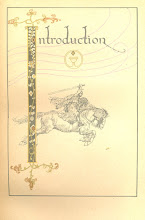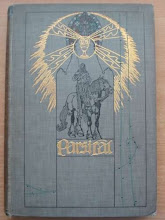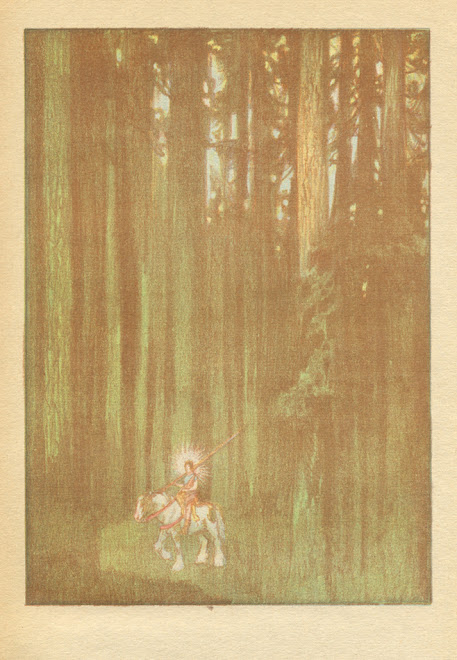I've been working so hard on edits for Parsifal that I decided to post a small section of what I've done. Here is the very first section of the book, still somewhat in progress (I can't vouch for perfect grammar yet), but you can see where it is headed.
A selection from Parsifal (or, The Holy Boy)
BOOK I:
The Forest and the Court
Once upon an olden time
In the forest’s leafy clime,
Dwelled therein a little boy
Who was his mother’s pride and joy.
‘Twere only just the two of them.
His father had been battle-claimed.
No siblings had the single child
And in the woods he grew up wild.
He was a wose, a greensward one
Born of the elements. The sun
Shone down upon him every day.
‘Twas no schoolhouse for that one, nay.
The boy was taught by stars and rain;
Educated by their plane
Was his mind. No geometry
Had molded him. Philosophy
Was a thought he'd never kenned.
He was taught by the west wind
And the woodland animals.
The lad’s brief life was very full
Of instinct. Living close to earth,
The forest thus defined the worth
Of his young world, its boundaries
Marked by the edge of the trees.
His mother had retreated there
When her dear husband fell to her
Defense. She held their growing babe
Still inside her, and there she gave
His birth to him. Her fear was strong.
To her love had her heart belonged
And she had grieved so passionately
She swore that his son would not see
Another man, so never fight,
And thus she would not lose his light.
All of his realm then was the small
Perimeter. He knew it all,
Every rock and every bird,
Whose singing he had always heard.
They made the music that he knew
And as the boy toward tallness grew
He mimicked them. He knew it not,
But his own voice was sweet, its note
Among the finest of all strain.
‘Twas tenor, with a pure and plain
True feeling that did powerfully
Transport, it so mellifluously
Expressed the essence of the one
Who sang, his natural emotion.
Parsifal was his name given
And he lived as if in the garden
Of mankind’s earliest existence,
A paradise of innocence.
He moved onward unconsciously
Toward his own maturity,
Knowing not what a man was
Save for a solitary guise,
A picture that his mother had
Of her dead husband. She had made
A painting of him, very small.
He’d been for her her one and all.
She had known him all her life
And wanted no more than to wife
The man her childhood love became.
He’d been a knight of figure handsome:
Black-haired was he, fair of skin,
And his eyes had been very green.
Such words described also the son.
When the grieving widow-woman
Looked at her child, she could see
A likeness, showing so exactly
Him she had loved that she swore
To e’er keep the boy there with her.
At his birth, she’d been very young
And so knew not that such was wrong.
She meant well, for she wanted him
Need never to encounter grim
And gruesome battle. ‘Twas a girl
And wanted peace in her own world.
Her name was Herzeleide, which meant
The sorrow of abandonment,
Which she knew well, for she had lived
That fate, and living still, she grieved.
She had lost her own dear love
And could not bear to ever leave
Her little son, so far away
Did she go then and there she stayed,
And kept him closely to her side,
Her sole treasure fiercely guarded.
Besides sharing with him speech,
The best resource she sought to teach
To him was her knowledge of God,
For holy things had ever awed
And acted on her. She was good
And taught her little one to read
Her Bible and her other book
Of prayers for every day. She took
The pair of volumes as she fled
Her household when her husband died.
His family and hers were noble;
Both were established and stable,
Prosperous. They did not know
Where she had gone, though high and low
They searched, for her son was the heir,
And as they did not find, they feared
The worst and felt that she had killed
Herself, and thus also the child,
And they stopped looking, though ‘twas late –
Diligently did they try it,
But ‘twas to no avail. She’d hid
Them too well in the deepest wood.
Monday, March 30, 2009
Subscribe to:
Post Comments (Atom)









No comments:
Post a Comment